Fox Maule-Ramsay, 11th Earl of Dalhousie
Fox Maule-Ramsay, 11th Earl of Dalhousie, KT, GCB, PC (22 April 1801 – 6 July 1874), known as Fox Maule before 1852, as The Lord Panmure between 1852 and 1860, was a British politician.
The Earl of Dalhousie | |
|---|---|
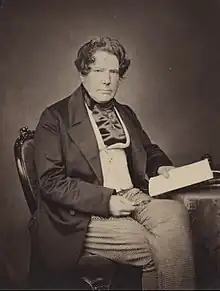 Daguerreotype of the 11th Earl of Dalhousie, c. 1858 | |
| Secretary of State for War | |
| In office 8 February 1855 – 21 February 1858 | |
| Monarch | Queen Victoria |
| Prime Minister | The Viscount Palmerston |
| Preceded by | The Duke of Newcastle |
| Succeeded by | Jonathan Peel |
| Personal details | |
| Born | 22 April 1801 |
| Died | 6 July 1874 (aged 73) |
| Nationality | British |
| Political party | Whig Liberal |
| Spouse |
Hon. Montague Abercromby
(m. 1807; died 1853) |
| Parent(s) | William Maule, 1st Baron Panmure Patricia Heron Gordon |
| Relatives | George Ramsay, 8th Earl of Dalhousie (grandfather) |
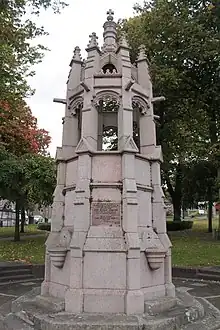
Ancestry
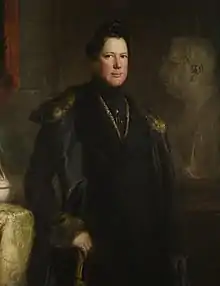
Dalhousie was the eldest son of William Maule, 1st Baron Panmure, and a grandson of George Ramsay, 8th Earl of Dalhousie. Christened Fox as a compliment to Charles James Fox, the great Whig, he served for a term in the Army.[1]
Early life and career
Fox Maule was born in Brechin Castle, on 22 April 1801. He was educated at the Charter House, London. In 1819 he received his commission as ensign in the 79th Regiment of Cameron Highlanders.[2]
For some years he served in Canada on the staff of his uncle, the Earl of Dalhousie. In 1831, having attained to the rank of captain, he retired from the army, and having married the Hon. Montagu, daughter of the second Lord Abercrombie, he took up his residence at Dalguise House, on the banks of the Tay, near Dunkeld. This was his home for twenty years.[3]
Fox Maule campaigned during the first election for Perthshire, canvassing in favour of his friend, the Marquis of Breadalbane, then Lord Ormelie. As he afterwards said, "I was politically born then." At the next election, in 1834, he was returned as member for Perthshire. Having lost his seat at the next election, he was returned for the Elgin Burghs. Having resigned his seat for the Elgin Burghs, he was elected by the city of Perth, which he continued to represent for ten years, until he was called to the House of Lords after his father's death.[3]
Political career
In 1835 he entered the House of Commons as member for Perthshire. In the ministry of Lord Melbourne (1835–1841), Maule was Under-Secretary of State for the Home Department, and under Lord John Russell, he was Secretary at War from July 1846 to January 1852, when for two or three weeks he was President of the Board of Control.[1]
In April 1852, he succeeded his father as 2nd Baron Panmure. In February 1855, he joined Lord Palmerston's cabinet, filling the new office of Secretary of State for War. Lord Panmure held this office until February 1858. He was at the War Office during the concluding period of the Crimean War, and met a good deal of criticism.[1] He was Keeper of the Privy Seal of Scotland from 1853 until his death.
Always interested in church matters, Dalhousie was a prominent supporter of the Free Church of Scotland after it split from the Church of Scotland in the disruption of 1843. In December 1860, he succeeded his kinsman, the 1st Marquess of Dalhousie, as 11th Earl of Dalhousie.[1] He shortly afterwards changed his surname to "Maule-Ramsay" (his father had changed his surname to "Maule" from the family's patronymic "Ramsay" before being created Baron Panmure).[4]
Death and legacy
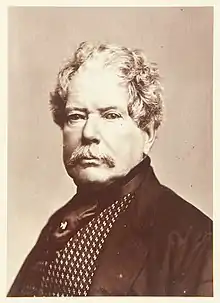
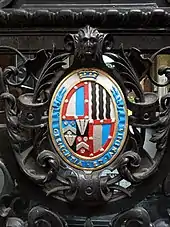
He died in Brechin Castle on 6 July 1874 in the same room in which he had been born.[3]
Free Church elder
For thirty years he was returned by the Free Presbytery of Dunkeld as their representative elder to the General Assembly, and took an active part in its proceedings. After the Disruption, when so many proprietors refused sites for the building of churches and manses, it was mainly through his speeches in Parliament that the difficulty was surmounted. He laid the foundation stone for the new Free Church at Dunkeld.[3]
Freemasonry
Maule was appointed Senior Grand Warden of the United Grand Lodge of England in 1832, and later (as Lord Panmure) Deputy Grand Master in 1857.[5] He was elected Grand Master of the Grand Lodge of Scotland in 1867.[5] In 1860, Panmure Lodge (now No. 723) was warranted, being named after the then Deputy Grand Master.[5]
Marriage
Lord Dalhousie married the Hon. Montague, daughter of George Abercromby, 2nd Baron Abercromby, in 1831. They had no children. She died in November 1853, aged 46. Lord Dalhousie died July 1874, aged 73. On his death, the barony of Panmure became extinct, but the earldom of Dalhousie (and its subsidiary titles) passed to his cousin, George Ramsay.[1]
References
Citations
- Chisholm 1911.
- Mackenzie, Ewart & Findlay 1887, p. 262.
- Wylie 1881.
- Sweetman 2014.
- "About Us". Panmure Lodge No. 723. n.d. Retrieved 16 July 2019.
Sources
- This article incorporates text from a publication now in the public domain: Chisholm, Hugh, ed. (1911). "Dalhousie, Fox Maule Ramsay, 11th Earl of". Encyclopædia Britannica. Vol. 7 (11th ed.). Cambridge University Press. p. 767.
This cites G. Douglas and G. D. Ramsay (editors), Panmure Papers, 1908. These numerous letters from Panmure's correspondence throw much light on the concluding stage of the Crimean War.
- Douglas, George Brisbane; Ramsay, George Dalhousie, eds. (1908). The Panmure papers; being a selection from the correspondence of Fox Maule, second baron Panmure, afterwards eleventh earl of Dalhousie with a supplemenary chapter by Rev. Robert Rainy. Vol. 1. London: Hodder and Stoughton.
- Mackenzie, Thomas Arthur; Ewart, John Spencer; Findlay, C., eds. (1887). Historical records of the 79th Queen's Own Cameron Highlanders. London: Hamilton, Adams.
- Sweetman, John (2014). "Maule, Fox [afterwards Fox Maule-Ramsay], second Baron Panmure and eleventh earl of Dalhousie (1801-1874), army officer and politician". Oxford Dictionary of National Biography (online ed.). Oxford University Press. doi:10.1093/ref:odnb/18365. (Subscription or UK public library membership required.)
- Walford, Edward (1894). "Maule, Fox". In Lee, Sidney (ed.). Dictionary of National Biography. Vol. 37. London: Smith, Elder & Co.
 This article incorporates text from this source, which is in the public domain.
This article incorporates text from this source, which is in the public domain. - Wylie, James Aitken, ed. (1881). Disruption worthies : a memorial of 1843, with an historical sketch of the free church of Scotland from 1843 down to the present time. Edinburgh: T. C. Jack. pp. 201–210.
 This article incorporates text from this source, which is in the public domain.
This article incorporates text from this source, which is in the public domain.